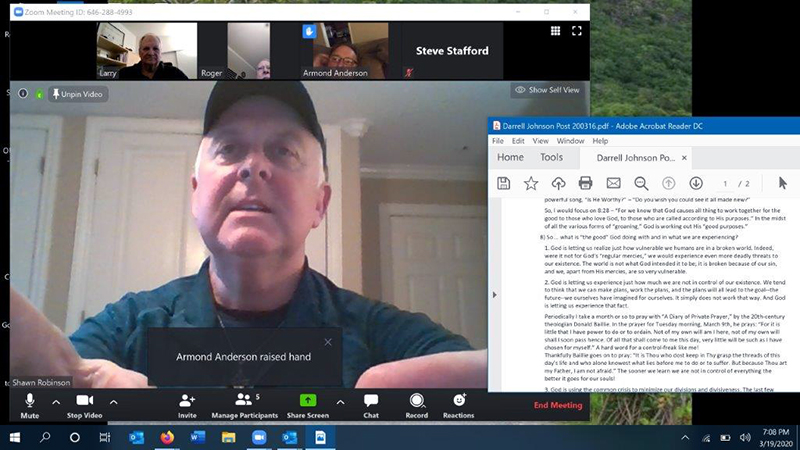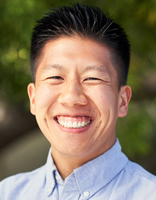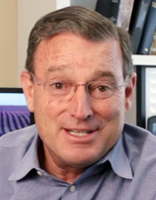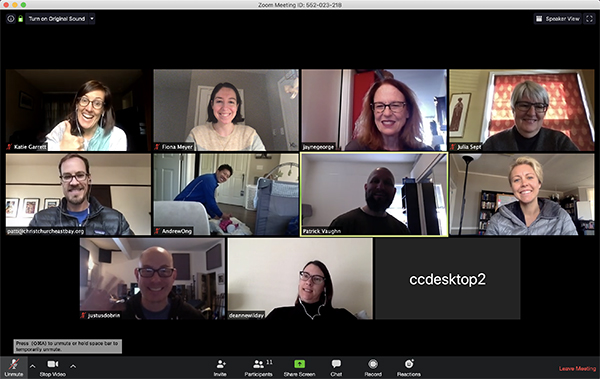
Shawn Robinson, Pastor of Clayton Community Church in Clayton, Calif., leads a virtual men’s Bible study on March 19 using Zoom, a popular online video conference tool.
Having an entire state on mandatory lockdown as a result of the coronavirus (COVID-19) pandemic presents unique challenges for state and local government, businesses, and 40 million residents of California.
For pastors and churches accustomed to gathering in groups and striving to meet the needs of their members and communities, the challenges take on a spiritual dynamic.
“COVID-19 has impacted our church the most by preventing us from gathering for Sunday worship and midweek community groups, creating isolation, and forcing new ways of maintaining community, fellowship, and worship,” said Andrew Ong, a ministry resident at Christ Church East Bay, which has campuses in Berkeley and Oakland, Calif.

Andrew Ong
Ong said about 20-25 percent of the church’s congregation is older than 50, with some of its senior members living alone.
“This is leading to much anxiety and loneliness,” he said. “We have a team who is almost done personally contacting all our seniors to make sure they know that we are here for them, and to identify any ways that we can serve them spiritually, materially, and emotionally.”
On March 16, San Francisco-area residents received a directive from Gov. Gavin Newsom to “shelter in place.” Three days later, Newsom announced the dramatic step of requiring all 40 million residents of the state to stay home to slow the spread of the coronavirus.
Scott Farmer, Transitional Pastor of Moraga Valley Presbyterian Church in Moraga, Calif., laughed during an interview above the screams of grandchildren.
“I’m good. I’m on grandpa duty right now,” he chuckled. “I’ve got a four- and six-year-old that are definitely ready to go to the park.”

Scott Farmer
Like Ong and other ministry colleagues around the country, Farmer said he and his church are doing their best to adapt to “the new normal.”
“There’s no normal,” Farmer acknowledged. “This is nowhere near normal. We’re adjusting. Last Friday we got one directive from county health not to have gatherings of more than 50, and we adjusted to that until Sunday night when the governor gave us a new directive. So we were gathering Monday morning to adjust to those. At one o’clock we got a new directive to shelter in place. All the schools were closed and all non-essential services. So that’s how rapidly it has been changing.”
Farmer said the church is doing its best to keep people connected.
“We send out an e-news update every week. I tell them what time of day that I send it out because information is changing so fast,” he said.
“All of our ministries: children’s, youth, men and women’s, missions—everyone is all remote now. So we’re all asking the questions, ‘How do you live as a church in a sheltered-in-place environment? How do you care for one another, and how do you care for the community?’”
He added that the church, like many, is broadcasting their worship online and holding Bible study classes online.
“All of our small groups and community groups are virtual now. We have activities for the children that are video-based online, with exercises and things like that.”
Farmer said as the church has increased its video and social media capacity, it has made it a priority to train older members on how to use it.
“They aren’t used to getting online, among other things. We are calling everyone in our congregation who are in their 70s, and we have a whole system of runners who are committed to doing their errands for them by going to the grocery store and anything else for those who are vulnerable,” he said.
“We’re also asking the congregation to think of ways we can serve one another and the community to let us know, and we’ll try to evaluate and respond.”
Shawn Robinson has served as Pastor of Clayton Community Church in Clayton, Calif. for 23 years, and said the lack of weekly gatherings has his ministry team working to create an online learning environment that keeps people connected. The congregation normally meets for worship in a local middle school.

Shawn Robinson
“Everything is online now,” Robinson said. “We are having a regular Sunday morning service that you can click on at the regular time. We recorded it, and this last Sunday (March 15) was our first one.”
Robinson said his staff recently called on him to prepare several weeks of messages ahead of time.
“We heard Monday morning that come midnight, the shelter-in-place was going to be in effect. So my worship team leaders came to me and said ‘Hey, can we record your messages today?’” Robinson laughed. “Well, OK, so we’re told to be ready to preach in and out of season—that became very real. I had maybe an hour to prepare but I think it went OK. Our executive pastor was going to do the next week, so basically we’ve got three weeks of messages ready.”
Robinson applauded the response of the church staff and ministry teams.
“They just all came together during this amazing time. We’re realizing that we’re not a megachurch, but what we send out we want to do with quality. Funny thing is, we have some recording equipment but if you have one of the newer iPhones the recordings on one of those are probably even better quality.”
He added he has been encouraged by the way people are engaging with the church—sometimes in unexpected ways.
“One of the interesting things that just cracks me up is that just before this happened, our office manager ordered a couple of cases of toilet paper,” Robinson recalled. “When we realized that we weren’t going to be able to get to our office, they brought it to my house. So I just went online and said, ‘Hey do you need toilet paper?’ I got so much response from that! We can say our motto is ‘We’ve got your backside!’”
In addition to dealing with the situation with hope and humor, Ong said the pandemic presents a unique opportunity for the Church to testify to the truth of Jesus and Scripture.
“We need to embody a countercultural community of selfless sacrifice, taking care of the least of these, first amongst ourselves, but also amongst our neighbors,” he emphasized. “We need to bear witness to our hope by not acting out of fear. Our hope is not ultimately in the markets, the government, or even in medical science, but in Christ—and we seek His Kingdom.”
Robinson has witnessed some surprising ways his church has been able to minister to people, spiritually, emotionally, and physically.
“I’m just watching our people really reach out to their neighbors, offering prayer, asking if they can go get groceries for the neighbors,” he said. “In that regard, it’s quite encouraging. It’s funny, but I’m kind of excited right now. It’s forcing us out of complacency.”
by Tim Yarbrough
EPConnection correspondent

The staff of Christ Church East Bay in Berkeley, Calif., participate in an online video conference staff meeting on March 17.
